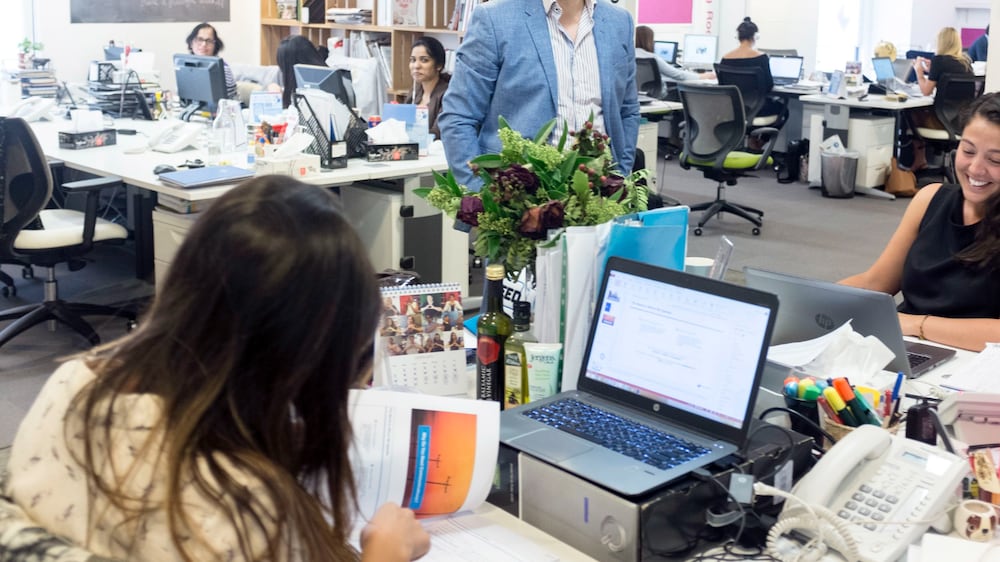As more companies worldwide require employees to return to the office amid a fall in the number of Covid-19 cases, the hybrid work model has become increasingly popular as it promotes a healthy work-life balance.
“The global pandemic has created a shift in the traditional way in which people work,” says Shiraz Sethi, regional head of employment at law company Dentons.
“Now, with Covid-19 cases subsiding, the prospect of returning full-time to office routines does not seem appealing or necessary.
“A hybrid workplace model refers to a flexible work environment that combines remote work with in-office working. It is necessary for business leaders to create a work environment that will keep employees happy and productive, while also preserving the culture and business needs.”
About nine in 10 UAE employees prefer a hybrid or fully remote working model in the future, according to a 2022 survey by California-based technology company Cisco.
Being flexible in how employees work is also key for companies to attract and retain talent in a post-pandemic environment, with 61 per cent of UAE professionals saying they would be less likely to look for a new job if given the opportunity to work either remotely or in the office for only one or two days a week, Cisco said.
Hybrid work arrangements also reduced attrition rates at global travel agent Trip.com by 35 per cent and improved self-reported work satisfaction scores, with no negative effect on performance ratings or promotions, according to a study by Nicholas Bloom and Ruobing Han of Stanford University, and James Liang of Peking University in Beijing.
We asked recruitment industry experts to share their advice on how employees can make their hybrid working week more fulfilling.
Optimise office days
Synchronised tasks should be saved for office days, says Mr Sethi. These are assignments that require collaboration, conversation, brainstorming or group creativity.
“Asynchronous tasks, which can be completed from start to finish without input from others, such as putting together a solo presentation or virtual mandatory training, should be done at home where there are larger blocks of uninterrupted time,” he says.
“Each worker will need to assign tasks to in-office or home days on the basis that works best for them.”
____________
Watch: Some of the stats behind the UAE's hiring boom
Some of the stats behind the UAE's hiring boom

Organise and plan ahead
It is critical to plan your days in advance, so you know exactly what you are doing when you are in or out of the office and there is no lag time, says Waleed Anwar, managing director of Dubai-based recruitment company Upfront HR.
Mr Sethi says planning your schedule ahead of time can make all the difference to achieving the right work-life balance, boosting productivity and connecting with your team.
Deciding which days you will be in the office, what tasks need to be prioritised and scheduling in-person meetings to catch-up will ensure your workload is manageable, he says.
Mr Anwar encourages the daily use of a cloud-based shared calendar that allows everyone to see what the rest of the team is doing at all times.
“This also always allows for collaborative work among team members,” he says.
Check in with your team
It is important to build rapport with your team to ensure that you can rely on them for support and collaboration, and to keep up with the latest developments, says Nicki Wilson, owner and managing director of Dubai-based consultancy Genie Recruitment.
Dentons’ Mr Shiraz says developing and maintaining relationships with colleagues is important to ensure that a business runs effectively.
“This can be as easy as popping by a colleague’s desk for a quick hello and update, coffee breaks, striking up conversations in the breakroom, joining mentor schemes or any groups set up by your company. This will also allow for building trust within the team,” he says.
Mr Sethi says you can also schedule in-person meetings, which will help you to network with new colleagues and allow you to check-in with your manager and team.
Additionally, arrange initiatives such as a cake day or group lunches to help foster team spirit and preserve business culture, he says.
Have a set routine
Having an “office routine” and “remote routine” has a direct impact on the success of your days, says Mr Anwar from Upfront HR.
Although the job you do is the same on a daily basis, there will always be a difference between both environments, he says.
“The most obvious one is the commute to the office. This will take up more time from your day, so you may want to plan your office days around the least busy days of the week, commute-wise — maybe not Monday morning, for example,” he says.
“Make it a routine that you come to the office on set days. Having a good routine helps you focus and get started in the right mindset.”
External communication
John Armstrong, founder and managing director of recruitment agency JCA Associates, says you should inform clients, customers or suppliers of your new working arrangement.
If they expect you to be in the office, they may think you are unavailable if you are not, he says.
“Simple things such as having a statement on your email signature saying you are working remotely will get the message across. You can divert your direct fixed-line number [if applicable] to your mobile,” Mr Armstrong says.
Promote inclusion
Ensure all internal face-to-face meetings include colleagues who are working remotely, Mr Armstrong says.
If a person’s presence is needed at a meeting, then they should be able to join either by video conference or by dialling in, he says.
Ms Wilson says systems such as Teams or Monday.com are quite useful in creating a collaborative space to communicate and track deadlines with the team.
“Ensuring you acquaint yourself [with] the latest tools is essential,” she says.
Be aware of company policies
Mr Sethi says having a home set-up that reflects the workplace will boost productivity and lessen the culture shock when one returns to the office.
Training and development programmes will also help you to re-engage and readapt to working from an office.
“Employees also need to ensure they are aware of the company's policies and procedures around returning to the office and ensure they comply with the rules and regulations,” he says.
“This can be as simple as making sure the employee wears the correct and appropriate attire within the office and ensure they behave appropriately with colleagues.”
____________






















